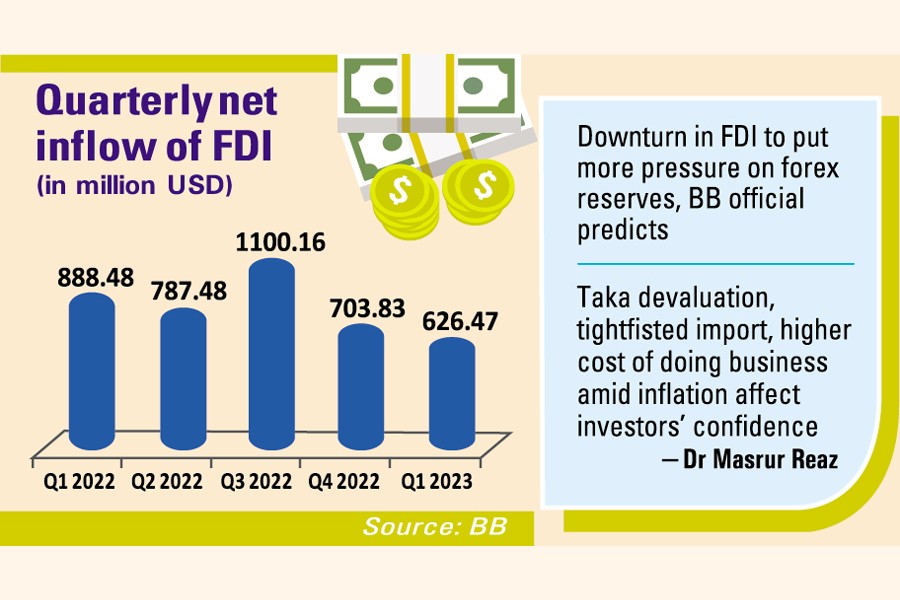Bangladesh sees 30pc fall in net FDI inflow in Q1 as global economic jitters weigh in

Among the other reasons the country sees prolonged balance-of-payments (BoP) shortfall are below-par remittance and export receipts, according to finance officials and economists.
The unhappy development in the area of inbound overseas investment comes at a time when the 450-billion-plus economy is passing tough times amid forex dearth in the wake of the country’s falling foreign-currency reserves.
In the January-March period of 2023, the FDI-starved Bangladesh received net inflow of overseas investment equivalent to US$ 626.47 million, down 29.49 per cent from US$ 888.48 million recorded in the same period of time a year before.
Compared with the immediate-past quarter, the figure also went down 10.99 per cent from US$ 703.83 million recorded in the last quarter (October-December period of 2022) of the previous calendar year, according to the Bangladesh Bank (BB) data.
Net FDI inflows are the value of inward direct investments made by non-resident investors, including reinvested earnings and intra-company loans. This excludes the amount that goes out of a country through the repatriation of capital and repayment of loans.
Non-EPZ area received the highest flow of $541.49 million while textiles and wearing becomes top foreign investment-earning sector pooling $ 143.81 million followed by banking ($93.43 million), telecommunications ($71.98 million), gas and petroleum ($55.28 million) and trading ($ 34.46 million).
Seeking anonymity, a senior BB official said the remarkable drop in net FDI inflow was observed mainly because of two factors – a drop in reinvestment by the foreign companies and increased volume of payback by foreign companies operating here.
Reinvested earnings plummeted 13.58 per cent while the inter-company loans went up 272.72 per cent in Q1 of this calendar year in year-on-year terms.
Terming FDI as the fourth major component in attracting foreign currencies here, the central banker said, “The downward trend in inbound overseas investment will put more pressure on the forex reserves.”
But the most interesting and surprising part of the Q3 FDI data is that the highest volume of the net overseas investment comes from Malta, a country that is not even seen on the list of major FDI-sending countries in the past.
Economists have, however, hailed the growth in this tough period of time, suggesting the authorities concerned to properly check the source of international investment to avert any possible trouble in the days to come.
When contacted, chairman of local think-tank Policy Exchange of Bangladesh Dr M. Masrur Reaz said the net FDI inflow dropped significantly mainly because of three major economic challenges the country is now facing.
“The existing volatility in local currency in the form of continued depreciation of Bangladeshi Taka against the greenback has basically been hurting confidence of the overseas investors in making fresh investment or expansion of their business here,” he says.
Tight-fisted import is giving a signal that the decision of putting in more money under such a
controlled business climate will not be sustainable one for the investors. “So, they defer their investment.”
On the other hand, the escalating cost of business in this higher-inflation regime is the third factor that is discouraging the foreign investors, he adds.
According to the BB data, the gross volume of forex reserves remained on a slide, amounting to $29.85 billion as of July 19, 2023 by official count, but the net volume of reserves under the IMF’s BPM6 manual is equivalent to $23.45 billion.
Source: The Financial Express

